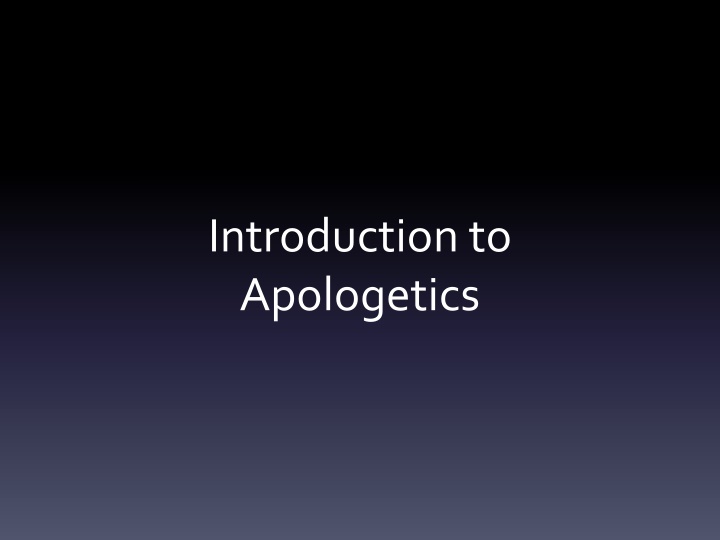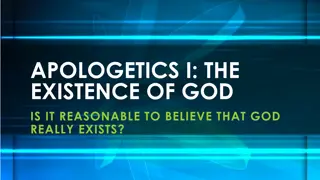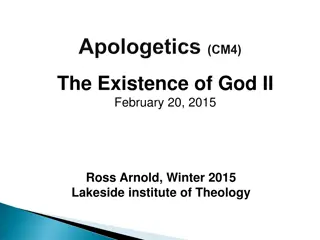
Introduction to Apologetics: Understanding the Defense of Christianity
Delve into the realm of Apologetics - the theological discipline focused on defending Christianity. Explore its origins, importance, types, key principles, and early church apologists. Discover why Apologetics matters and how it aids in answering questions and defending the gospel with grace and wisdom. Uncover the significance of Apologetics in complementing Bible teachings and sanctifying the Lord in your heart.
Download Presentation

Please find below an Image/Link to download the presentation.
The content on the website is provided AS IS for your information and personal use only. It may not be sold, licensed, or shared on other websites without obtaining consent from the author. If you encounter any issues during the download, it is possible that the publisher has removed the file from their server.
You are allowed to download the files provided on this website for personal or commercial use, subject to the condition that they are used lawfully. All files are the property of their respective owners.
The content on the website is provided AS IS for your information and personal use only. It may not be sold, licensed, or shared on other websites without obtaining consent from the author.
E N D
Presentation Transcript
Introduction to Apologetics
Contents I. What is Apologetics? II. Why Do Apologetics? III. Types of Apologetics IV. Key Points
I. What is Apologetics? A) Definition: Apologetics is the branch of theology concerned with the defense or proof of Christianity. B) Word origin: -The term Apologetics is derived from the Greek word Apologia ; meaning a speech of defense or reply . - In the Classical Greek legal system, the prosecution would deliver the kategoria , the accusation and the defendant would reply with an apologia , or the defense.
I. What is Apologetics? -An apologetic is an argument in support of Christian faith or defending it against accusations of inaccuracy, irrationality, immorality etc. C) Key Verse: But sanctify the Lord God in your hearts, and always be ready to give a defenseto everyone who asks you a reason for the hope that is in you, with meekness and fear (1 Peter 3:15) D) Apologetics and the Holy Bible:
I. What is Apologetics? -Apologetics is not apart from the Bible, but a compliment to Bible teaching: You search the Scriptures, for in them you think you have eternal life; and these are they which testify of Me (John 5:39) E) Early church apologists: 1. Justin Martyr: Rome; 2ndcentury 2. Irenaeus: Against Heresies 3. Clement of Alexandria: Exhortations
I. What is Apologetics? 4. Athanasius: On the Incarnation 5. Eusebius of Caesarea: Proof of the Gospel 6. Tertullian: Apologetics ; 197 A.D.
II. Why Do Apologetics? A) Concept of Apologetics: 1. It is defending the gospel: Knowing that I am appointed for the defense of the gospel (Philippians 1:17) 2. It is answering every question: Let your speech always be with grace, seasoned with salt, that you may know how you ought to answer each one (Colossians 4:6)
II. Why Do Apologetics? 3. It is reasoning with unbelievers: And he reasoned in the synagogue every Sabbath, and persuaded both Jews and Greeks (Acts 18:4) 4. Casting down arguments: Casting down arguments and every high thing that exalts itself against the knowledge of God, bringing every thought into captivity to the obedience of Christ (2 Corinthians 10:5)
II. Why Do Apologetics? B) Why Apologetics? 1. Validate Christian truth: - Involves employing philosophical arguments, empirical and historical evidences for the Christian faith. - Why does truth matter? Because eternity is an awfully long time to be wrong! -Goal is to develop a rational and reasonable case for Christianity against opposing beliefs and worldviews.
II. Why Do Apologetics? -What is worldview ? A particular philosophy of life or conception of the world. A person s worldview will affect the way in which he looks at and interpret everything. 2. Save the lost: -Goal is not to win an argument, but instead to persuade unbelievers, by removing the roadblocks that keep them away from Christianity. The goal in most conflicts is to destroy your opponent. The goal in apologetics is to win your opponent [Ravi Zacharias]
II. Why Do Apologetics? -The desired end result is the salvation of the unbeliever. Nearly everyone I know who has embraced Christianity in adult life has been influenced by what seemed to him to be at least a probable argument for theism [C.S. Lewis] -Apologetics helps guide skeptics and unbelievers through today s worldview maze. -Uses facts and evidences that lead to God s truth and their salvation.
II. Why Do Apologetics? 3. Strengthen the Church: -Attacks from atheists and skeptics can leave believers with doubts and a weakened faith. -Apologetics supplies the Christian with rational, logical, and evidential truths that undergird their trust in the Bible. That we should no longer be children, tossed to and fro and carried about with every wind of doctrine, by the trickery of men, in the cunning craftiness of deceitful plotting, but, speaking the truth in love, may grow up in all things into Him who is the head Christ (Ephesians 4:14-15)
II. Why Do Apologetics? C) The Urgent Need for Apologetics: 1. The demands of religion are changing: - People are more likely to walk away from a faith where doubts are not answered. - (70-75 )% of Christian youth leave the church after high school. - Main reasons for those youth are doubts in the Bible, where 40% of doubts begin in middle school. -Christian youth are not being taught to cross examine the skeptical and atheistic views they encounter when they leave home.
II. Why Do Apologetics? -College professors are five times more likely to identify themselves as atheists than the general public. -Christian students are not equipped to resist rabidly anti-Christian professors, who are intent on converting their students to atheism. 2. The view of truth is changing: - People are more likely to follow a belief based on an emotional assessment rather than a rational assessment. - Emotional assessment here may be driven by a certain lifestyle or a bad experience.
II. Why Do Apologetics? 3. The nature of skepticism is changing: -Skeptics are becoming more hostile against traditional faith views. + Good Philosophy must exist, if for no other reason, because bad philosophy needs to be answered [C.S. Lewis]
III. Types of Apologetics A) Apologetics could be either: 1. Reactively: Responding to questions by removing intellectual barrier. 2. Proactively: Sharing the relevant message of the gospel (reaching out). B) Types of Apologetics: 1. Evidential: - Defending faith by highlighting pieces of evidence.
III. Types of Apologetics - However, people may read an evidence through their own worldview: e.g. St. Paul healing the crippled man in Lystra: Now when the people saw what Paul had done, they raised their voices, saying in the Lycaonian language: The gods have come down to us in the likeness of men (Acts 14:11) 2. Pre-suppositional: The presuppositionalist asserts that the authority of the Bible should be the
III. Types of Apologetics assumed starting point in apologetic discourse. -Asking aChristian to abandon the Bible for the sake of discussion is like asking an atheist to prove there is noGod by using only the Bible. - By questioning an unbeliever s presuppositions and requiring them to justify their rationality, the apologist reduces their position to absurdity. -The goal of this apologetic approach is to undermine a non-Christian s worldview by demonstrating that without the Christian God, they cannot consistently claim meaning, truth, or logic.
III. Types of Apologetics C) Self-Contradicting Worldviews: 1. Relativism: There is no absolute truth. - Is that absolutely true? 2. Materialism: Only material world exists. - Is that statement material?
III. Types of Apologetics 3. Scientism: We can only know what science proves. - Is that scientifically proven?
IV. Key Points 1. Apologetics should also include a clear message sent through the life of the apologist. - Every apologist should reflect the Lord Jesus in their character. -Sadly, the best argument against Christianity can be a life that in no way represents the teachings of Christ. - They would have to sing better songs for me to believe in their Saviour: His disciples would have to look more redeemed! [Frederick Nietzsche] 2. It should be understood that apologetics is not the ultimate cause of a person s salvation. God is the one who saves:
IV. Key Points Now a certain woman named Lydia heard us. She was a seller of purple from the city of Thyatira, who worshiped God. The Lord opened her heart to heed the things spoken by Paul (Acts 16:14) -Therefore apologetics is like opening a window in a dark room so that light may come in. - e.g. Bringing a horses to water so that they may drink. 3. Most skepticism is not intellectually driven, with an underlying factor; that could be an emotional one (a lifestyle).
IV. Key Points 4. Half the battle is wining an audience, not an argument. 5. Try to speak to them in their own language: Brethren and fathers, hear my defense before you now. And when they heard that he spoke to them in the Hebrew language, they kept all the more silent (Acts 22:1-2) 6. Try to be encouraging and commend the positive, if any: Then Paul stood in the midst of the Areopagus and said: Men of Athens, I perceive that in all things you are very religious (Acts 17:22)
IV. Key Points 7. Start from where they stand at and try to find a common ground: For as I was passing through and considering the objects of your worship, I even found an altar with this inscription: TO THE UNKNOWN GOD. Therefore, the One whom you worship without knowing, Him I proclaim to you (Acts 17:23) 8. Some skeptics won t listen, no matter how rational you are. - e.g. Our Lord Jesus and the Pharisees. -What to do when reason does not work? Continue to preach through the fifth gospel, that is our life example:
IV. Key Points You are our epistle written in our hearts, known and read by all men; clearly you are an epistle of Christ, ministered by us (2 Corinthians 3:2-3) 9. To answer or not to answer? -The Lord Jesus did not answer every critic. Sometimes it is better not to give them credibility: Tell us, by what authority are You doing these things? Or who is he who gave You this authority? But He answered and said to them: I also will ask you one thing, and answer Me: The baptism of John was it from heaven or from men? (Luke 20:2-3)
IV. Key Points -Consider then: a) Is the criticism sincere or just venting anger? b) Will the answer help or have no effect? c) Is it the first answer or we are rehashing old arguments? d) Is the criticism reasonable or unreasonable? e) Would bystanders be affected if not giving an answer? f) Am I responding in anger or objectively?
IV. Key Points Essentially, I realized that to stay an atheist, I would have to believe that nothing produces everything; non-life produces life; randomness produces fine-tuning; chaos produces information; unconsciousness produces consciousness; and non-reason produces reason. Those leaps of faith were simply too big for me to take, especially in light of the affirmative case for God's existence and Jesus' resurrection (and, hence, his divinity). In other words, in my assessment the Christian worldview accounted for the totality of the evidence much better than the atheistic worldview [Lee Strobel]








